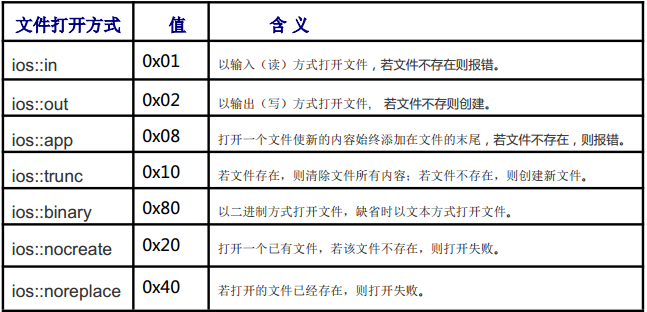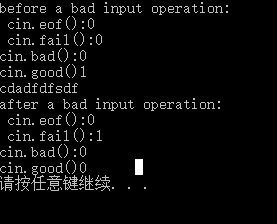c++中IO输入输出流总结<二>
1 文件的打开和关闭
1.1 定义流对象
ifsteam iflie;//文件输入流对象
ifsteam iflie;//文件输出流对象
fsteam iflie;//文件输入输出流对象
1.2 打开文件
void open(const unsigned char* filename,int mode,int accessfilebuf:opnprot)
mode为打开的方式,相关标记如下图所示(ios中)

注意:
(1)通常打开方式用|组合起来
ios::in|ios::out //读写方式打开文件
ios::out|ios::binary //二进制写方式打开文件
(2)iftream:默认ios::in
ofstream:默认ios::out|ios::trunc
fstream:默认ios::in|ios::out|ios::app
2 状态函数
eof():读文件到达末尾 true
bad():读文件出错返回true 当我打开一个不可以写但是进行写入的时候
fail:当需要输入整形的时候我们输入了字母
good:如果上面任何一个函数都是true的话 返回false
clear():
#include <iostream> #include <stdlib.h> using namespace std; int main() { int integerV; cout << "before a bad input operation:" << "\n cin.eof():" << cin.eof() << "\n cin.fail():" << cin.fail() << "\ncin.bad():" << cin.bad() << "\ncin.good()" << cin.good() << endl; cin >> integerV;//control +D/Z cout << "after a bad input operation:" << "\n cin.eof():" << cin.eof() << "\n cin.fail():" << cin.fail() << "\ncin.bad():" << cin.bad() << "\ncin.good()" << cin.good() << endl; system("pause"); return 1; }

3 (cin)和(!cin)的分析
不管是while(cin)还是if(cin)都是合法的为什么?自定义一个类,然后定义这个类的对象,使用if语句判断它是不合法的。说明流对象有莫中转换函数 可以将一个流对象转换成判断语句可以识别的类型
operator void*() const函数在while(cin)或者if(cin)隐式转换位void*类型
bool operator!() const;函数在while(!cin)或者式if(!cin)被调用 将流对象转换成bool对象
while(cin)--->while(!cin.fail)
while(!cin)---->while(cin.fail)
1 class A 2 { 3 public: 4 A(){} 5 ~A(){} 6 operator void*() const 7 { 8 cout << "cast to void*"; 9 return (void*)this; 10 } 11 bool operator!() const 12 { 13 cout << "cast to bool"; 14 return true; 15 } 16 }; 17 18 int main() 19 { 20 A a; 21 if (a)cout << "first" << endl; 22 if (!a)cout << "second" << endl; 23 system("pause"); 24 return 1; 25 }

4 文件读写操作
